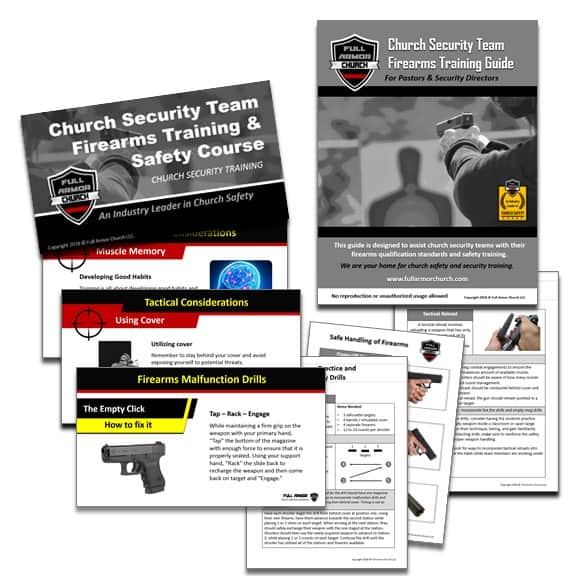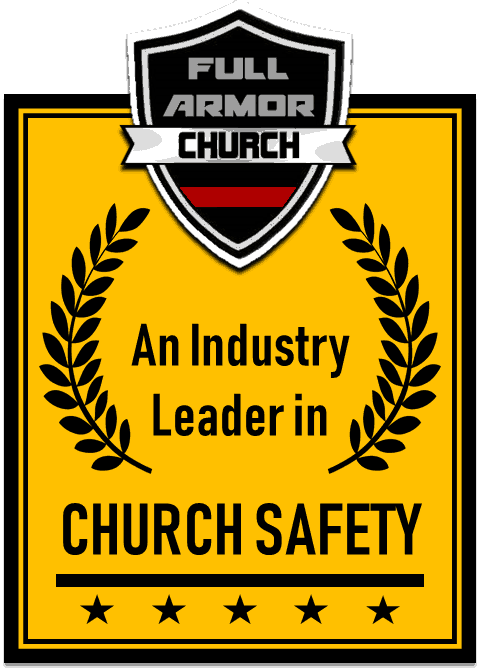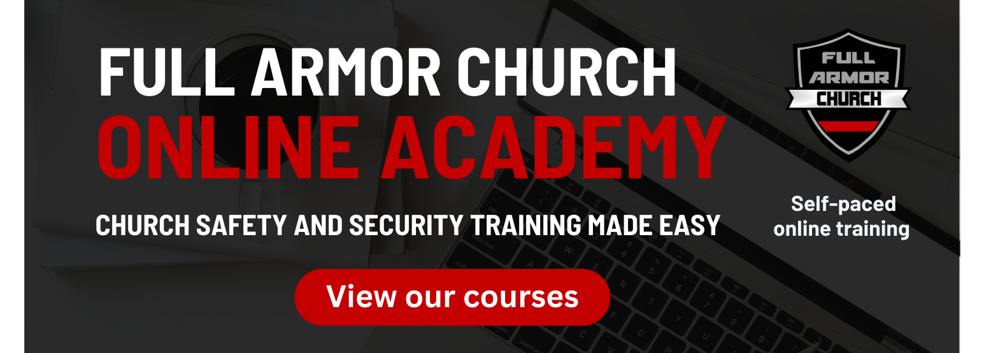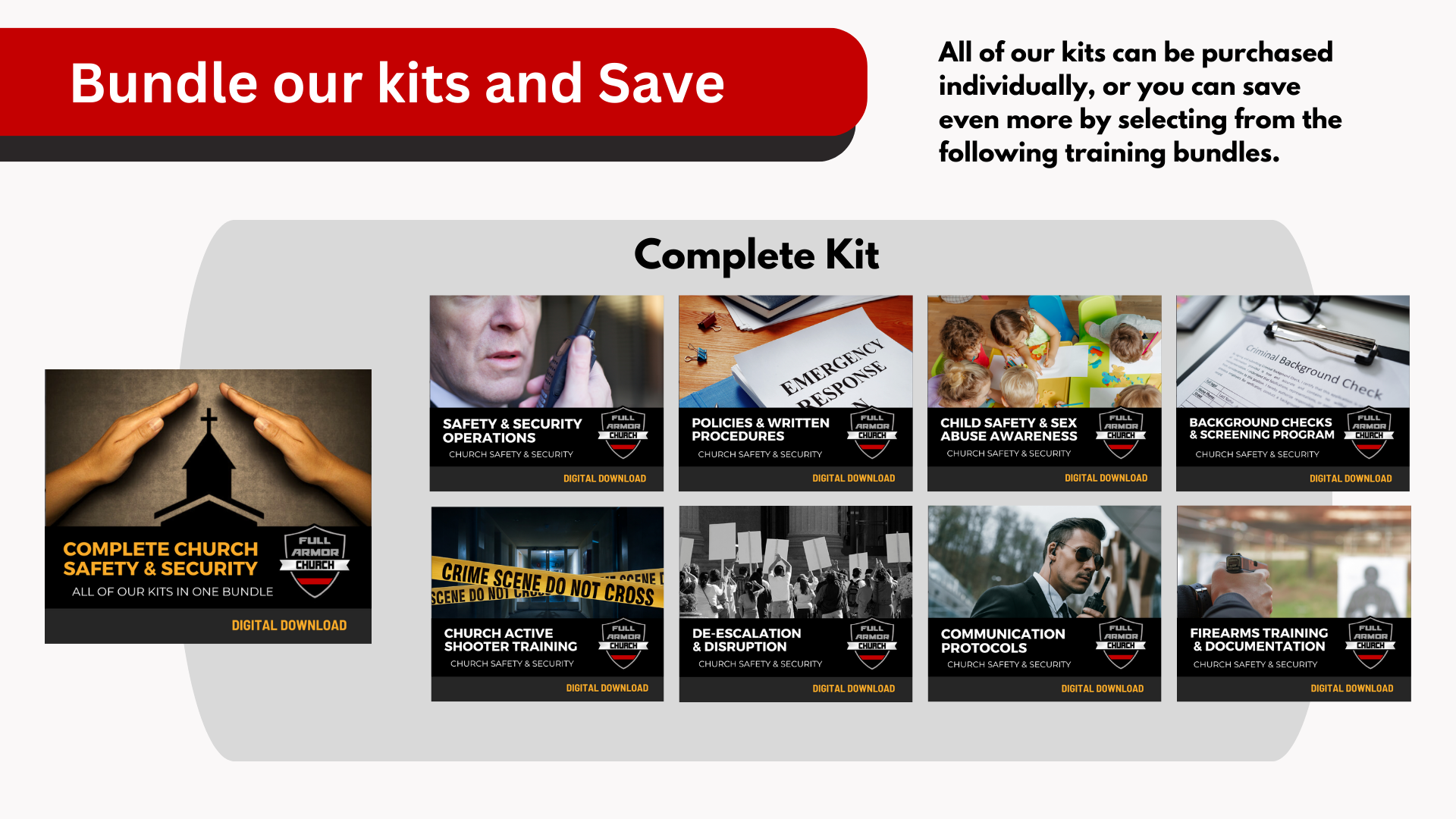How to Operate an Armed Church Security Team
Fostering safer environments where individuals can gather freely and nurture their faith lies at the core of our mission as the church. While we are fortunate to reside in a society governed by laws and supported by local emergency services, we must never lose sight of our moral and legal responsibility to safeguard the well-being of our congregations. Designating individuals who are prepared to assist during times of need isn’t merely an option; it’s a mandate.
Ministries must be equipped to manage emergencies effectively, especially during the critical first five minutes before the arrival of first responders after dialing 911. While we hope for the best, we must remain prepared to address the worst-case scenarios.
At Full Armor Church, we often receive inquiries from ministries seeking guidance on implementing armed safety and security programs. However, given the unique nature of each ministry and the legal complexities involved, there’s no one-size-fits-all solution to this query. It’s imperative for ministries to seek direct counsel from their local attorney or insurance provider to ensure compliance with legal parameters. Nonetheless, the following considerations may offer valuable insights:
Should our church safety or security team members carry firearms?
Staying within the legal boundaries
Before authorizing your church security team members to carry concealed weapons or less-lethal alternatives, it’s imperative to thoroughly research your local and state laws to ensure compliance. Some states enforce stringent regulations governing weapon possession, even on private premises, particularly concerning individuals serving on safety or security teams representing the church.
While most states may not have explicit prohibitions on such activities, some might mandate that churches obtain a business license and operate their security programs as distinct entities. The key is to conduct thorough research before embarking on such initiatives, crafting a program that operates within legal bounds. It can be beneficial to reach out to larger ministries in your vicinity, as they may have already navigated similar challenges and can offer valuable insights into their findings and program structure.
Furthermore, it’s advisable to seek legal counsel well-versed in pertinent laws, consult with your insurance providers, and engage with local law enforcement agencies for guidance. The last thing any church desires is to inadvertently expose itself to criminal or civil liabilities.
In addition to legal considerations, it’s crucial to ensure that all safety or security team members undergo thorough screening, vetting, and documentation. In addition to background checks, maintaining copies of team members’ state-issued firearms permits or valid agency identification on file is prudent.
The following link may provide some additional information on state laws:
Operating an armed church security program
Having an armed security presence on-site undoubtedly offers significant advantages. However, if not managed correctly, it can potentially lead to more harm than good. As a fundamental principle, operating an armed church security team necessitates proper oversight, training, and documentation. If unwilling or unable to fulfill these requirements, exploring safer alternatives, such as hiring a private security firm or contracting off-duty law enforcement officers, may be preferable. Even for those operating armed programs, leveraging additional resources like local law enforcement can enhance overall security measures, with many larger ministries opting for their assistance in monitoring exterior areas and managing traffic, allowing internal security processes to focus on other aspects.
Once the legality of the program is confirmed, attention should turn to the logistical and organizational aspects required for safe operation. To assist with this, we have compiled resources and tools tailored to your needs.
Classroom instruction serves as a foundational step, ensuring team members are well-versed in relevant policies, procedures, and training material before engaging in any physical or live-fire exercises. Conducting these sessions in a controlled environment helps eliminate distractions and enhances content retention. Visual aids and handouts can further reinforce learning, while live demonstrations of weapons techniques and tactical exercises provide valuable hands-on experience within the classroom setting.
Tabletop exercises are invaluable for reinforcing understanding and readiness. By presenting hypothetical scenarios, team members can verbally engage and demonstrate their grasp of concepts, simulating drills and walk-throughs to assess responses and decision-making.
For team members authorized to carry concealed weapons, annual firearms qualification and regular weapons handling drills are essential to maintaining proficiency and skill development. While live-fire exercises may be restricted by range limitations, simmunition-based training offers a practical alternative for honing skills and enhancing readiness. Training fosters creativity, and utilizing available resources effectively can significantly improve comfort and proficiency while mitigating liability risks.
While our training resources enable churches to conduct their own annual firearms training, some may prefer external assistance. In such cases, reaching out to local firing ranges or gun clubs can provide access to certified firearms safety instructors willing to offer guidance and support.
Documentation is critical to your success
Detailed record keeping is crucial when overseeing a safety or security ministry program. Following any significant incident, local law enforcement, government agencies, and civil attorneys may require access to your emergency response plans, written procedures, and training records for team members. Therefore, it’s essential for every church operating a security team to be capable of providing and readily sharing the following items:
 Security team policies
Security team policies- Emergency response plans and policies
- Roles and responsibilities
- Applications and background checks for team members
- Copies of concealed carry permits or government ID
- Training records and classroom rosters
- Weapons approval forms
- Firearms qualification records
- Training resources and response guides
At Full Armor Church, we understand church safety and have assembled everything you need to organize and operate your safety and security ministry. Several of the above-listed items are contained within our Firearms Training Kit and our Complete Church Security Kit.
When conducting firearms training, you should incorporate any liability release waivers and have members sign for a receipt of the established safety rules. You should also require team members to have security team applications on file and require the completion of a firearms approval request form for every weapon they intend to carry in the course of their duties. We have included all of these forms, as well as a sample annual firearms qualification form, inside our Firearms Training and Qualification Kit.
Stay grounded and Stay Safe
Stay centered, stay simple, and stay safe
The essence of firearms training lies in its practicality. It’s crucial to focus on exercises and drills that align with the anticipated scenarios encountered in the scope of a person’s duties, avoiding unnecessary complexities. Moreover, fostering a team mentality is paramount; training should progress at a pace that accommodates all members, ensuring that the weakest links are not left behind. Remember, training is not a competition; it’s a means of preparation.
Given that most church security teams rely on volunteers, finding time and resources for adequate preparation can be challenging. However, it’s imperative to seize every opportunity for training and leverage the unique strengths of each team member. If fortunate enough to have individuals with specialized expertise, such as firearms instruction or law enforcement/military backgrounds, harness their skills to enhance overall training effectiveness. Consider reaching out to local firing range instructors or engaging with law enforcement agencies for additional support. Ultimately, while firearms training is crucial, it’s just one facet of the comprehensive approach needed to enhance church safety.
In addition to our Firearms Training and Qualifications Kit, we also offer our Active Shooter Kit for churches. This additional resource contains training programs for congregational and security team models. It also includes an instructor’s guide to assist in conducting on site drills.
About us
Full Armor Church is the premier provider of church safety solutions, offering cost–effective background checks for ministries, church security resources for security directors and pastors, and training courses to help churches create and maintain a spiritually–focused and tactically–sound security program. Our materials incorporate proven risk-management concepts and critical incident response protocols that can help to make your ministry safer.
For more resources and information, visit FullArmorChurch.com







1 Comment
Leave your reply.